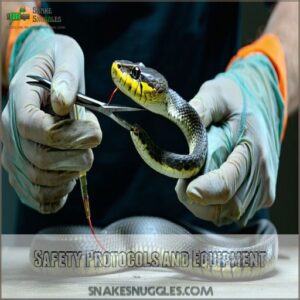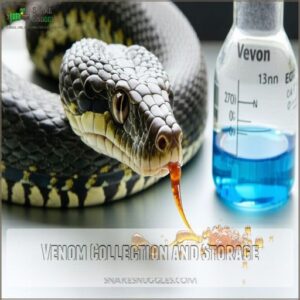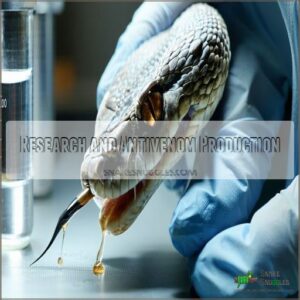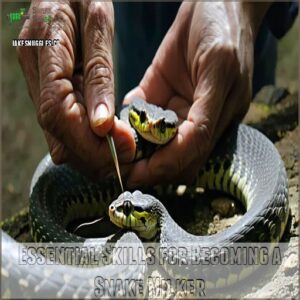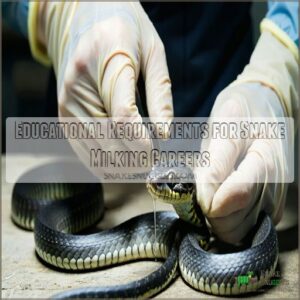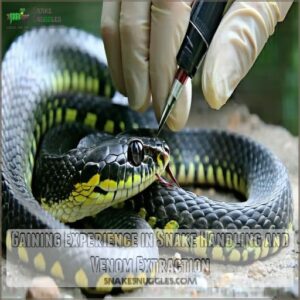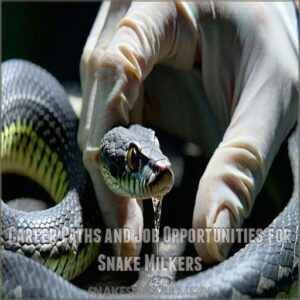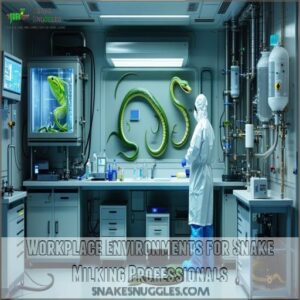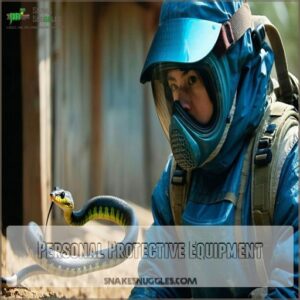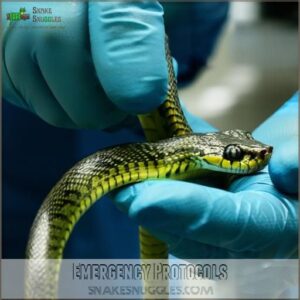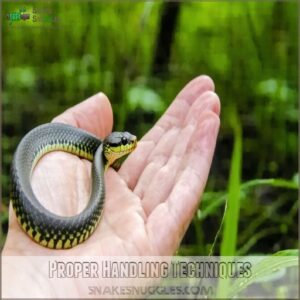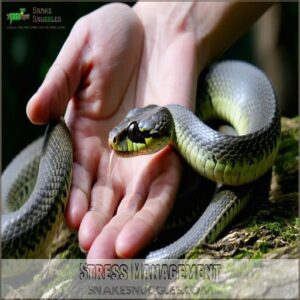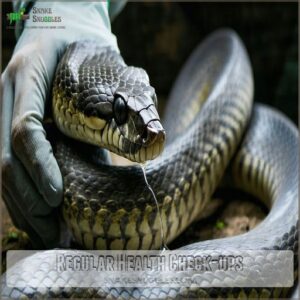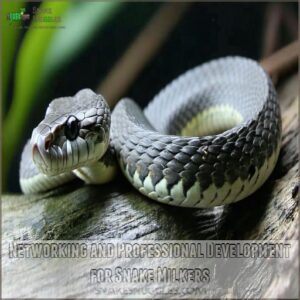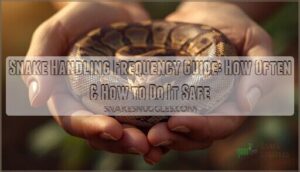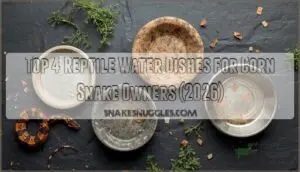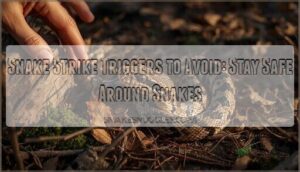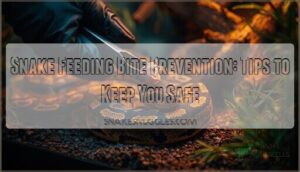This site is supported by our readers. We may earn a commission, at no cost to you, if you purchase through links.

Start by earning a biology or herpetology degree, then plunge into specialized courses on snake handling and venom extraction.
Master the art of steady hands and lightning-fast reflexes while learning snake identification and safety protocols.
Seek internships at wildlife centers or research labs to gain hands-on experience with these slithery subjects.
Snag certifications in venomous snake handling and first aid, and don’t forget protective gear—those fangs are no joke!
Remember, this isn’t just a job; it’s a high-stakes dance with some of nature’s most dangerous performers.
Table Of Contents
- Key Takeaways
- What Does a Snake Milker Do?
- Essential Skills for Becoming a Snake Milker
- Educational Requirements for Snake Milking Careers
- Gaining Experience in Snake Handling and Venom Extraction
- Career Paths and Job Opportunities for Snake Milkers
- Workplace Environments for Snake Milking Professionals
- Salary Expectations and Job Market Outlook
- Health and Safety Considerations in Snake Milking
- Networking and Professional Development for Snake Milkers
- Frequently Asked Questions (FAQs)
- How do I become a snake milker?
- What does a snake milker do?
- What is snake milking?
- How do you milk a snake?
- How do I become a snake milking zoologist?
- Where can a snake milker get a job?
- What Protective Gear is Used When Milking Snakes?
- What is the Risk of Working With Venomous Snakes?
- How Are Venom Extracted From Snakes?
- What is the Process of Producing Antivenom?
- Conclusion
Key Takeaways
- You’ll need a solid educational foundation in biology, zoology, or herpetology, with specialized training in venomous snake handling and venom extraction techniques to kickstart your career as a snake milker.
- Master critical safety skills, including precise handling techniques, emergency protocols, and comprehensive protective gear to manage the high-risk nature of working with venomous snakes.
- Gain hands-on experience through internships, volunteer opportunities, and apprenticeships at wildlife centers, research labs, and zoos to build practical expertise in snake milking and venom extraction.
- Develop a professional network by joining herpetological societies, attending industry conferences, and staying current with continuing education to maximize your career prospects in this specialized field.
What Does a Snake Milker Do?
You extract venom from snakes using safe, precise techniques while ensuring the animal’s well-being.
Your work involves handling snakes, collecting venom, and storing it properly.
for use in research, medicine, or antivenom production.
Venom Extraction Process
Extracting venom is delicate work requiring skill and precision.
Here’s how you do it:
- Secure the snake to prevent injury.
- Stimulate venom glands using gentle pressure or electrical stimulation.
- Collect venom in sterile containers for purity.
- Store venom properly to maintain quality.
Safety Protocols and Equipment
Snake milking safety relies on protective gear like snakeproof boots, thick gloves, and durable clothing.
Use venom handling tools carefully, follow detailed risk assessments, and design facilities for emergencies.
Every piece reduces accidents during venom extraction methods.
Types of Snakes Commonly Milked
Milking venomous snakes for profit usually involves these species, each posing unique challenges and requiring expert milking techniques:
- King Cobra: High venom yields, requiring precision.
- Black Mamba: Lightning-fast, highly toxic.
- Rattlesnakes: Regional variations, diverse in behavior.
- Coral Snakes: Small size, tricky handling.
Venom Collection and Storage
Handling venom demands precision.
You’ll collect it in sterile containers, then freeze or freeze-dry it for storage.
Facilities guarantee legal compliance, rigorous quality checks, and proper methods for snake venom harvesting—keeping every drop usable and safe.
Research and Antivenom Production
Extracted snake venom powers critical advancements in antivenom development and medical research.
- Toxicity studies for life-saving treatments.
- Clinical trials exploring venom components.
- Market analysis in the booming $3.95 billion venom industry.
Essential Skills for Becoming a Snake Milker
If you’re thinking about snake milking, you’ll need more than bravery—you’ll need solid skills to navigate venom handling and stay safe.
Successful snake milkers master key traits:
- Steady hands and quick reflexes: Precision is critical because even a minor slip can mean danger during snake venom extraction.
- Strong knowledge of snake identification: Not all snakes are milked the same way. Recognizing species helps you adapt handling techniques while following proper safety protocols, including understanding defensive postures.
- Dexterity with a calm mindset: Careful manipulation guarantees the snake’s well-being and maximizes yield without harm, keeping animal welfare forefront in mind.
Snake handling isn’t just a job; it’s an art that requires focus and respect for these remarkable creatures.
Educational Requirements for Snake Milking Careers
You’ll need a solid foundation in biology, zoology, or a related field to start a career in snake milking.
Specialized courses and hands-on training in herpetology, venom extraction, and toxicology will help you meet the job’s unique demands.
Relevant Degree Programs
Ready to get started with snake milking?
Start with a biology, zoology, or herpetology degree.
Herpetology programs teach snake behaviors, while toxicology and chemistry courses explore venom composition.
These zoology options prepare you for handling wildlife and extracting venom safely.
Specialized Courses in Herpetology
Herpetology courses teach you the art of working with reptiles, focusing on venomous snake biology and handling.
When choosing a program, look for:
- Course accreditation
- Hands-on venom extraction techniques
- Curriculum comparison for career prospects
- Tuition costs
- Familiarity with snake handling safety practices to minimize risks during venom extraction.
Certifications and Licenses
To become a snake milker, you’ll need proper certifications and licenses to prove your expertise in venom extraction and reptile handling.
| Certification/License | Requirements | Validity |
|---|---|---|
| Venomous Snake Handling | 40-hour course, practical exam | 2 years |
| Wildlife Capture Permit | Background check, state-specific criteria | Annual |
| First Aid Certification | CPR, snakebite management training | 3 years |
| Venom Extraction License | Apprenticeship, written and practical tests | 5 years |
Stay compliant with reciprocity issues and renewal processes to continue milking safely.
Hands-on Training Opportunities
Hands-on experience is the backbone of snake milker training. Get hands-on experience through internships, shadow experts, or join apprenticeships to master venom extraction.
Sharpen your skills with:
- Volunteer work at zoos, labs, or clinics.
- Workshops offering snake handler training.
- Field shadowing for real-world techniques.
Continuing Education Requirements
Staying sharp in snake milking education means embracing snake milker qualifications required beyond training time.
Tackle continuing education requirements like:
- Advanced toxicology courses
- Venom chemistry workshops, which can be supplemented with additional training through online venom chemistry training.
- Herpetology conferences
- Ethical considerations seminars
Fuel your knowledge and master your antivenom production training—knowledge always evolves.
Gaining Experience in Snake Handling and Venom Extraction
You’ll need hands-on practice to build confidence in handling venomous snakes and extracting venom safely.
Start by seeking internships, apprenticeships, or volunteer roles where you can learn directly from experienced professionals.
Internships at Reptile Centers
Exploring reptile center choices through internships lets you build hands-on experience in venom extraction, reptile handling, and safety training.
Many centers also offer reptile center internships that cater to various species and herpetology specializations.
Immerse yourself in herpetology’s practical side while sharpening essential skills for future career prospects in snake milking and venom research.
Volunteer Opportunities in Zoos
Joining zoo volunteer programs is a fantastic way to kickstart your snake milking journey. You’ll develop essential skills like handling reptiles, understanding habitats, and supporting conservation.
- Application process: Submit forms, interviews, and background checks.
- Required skills: Patience, curiosity, and strong teamwork.
- Time commitment: Weekly or flexible schedules.
- Hands-on learning: Assist herpetologists with exhibits and animal care.
- Career impact: Build connections and valuable field experience.
Apprenticeships With Experienced Snake Milkers
Looking for hands-on learning? Apprenticeships with experienced snake milkers are perfect for mastering safety, snake milking techniques, and venom extraction.
Finding mentors in this field sharpens your skills and sets you apart on your professional snake milker career path.
| Skill | What You Learn | Why It Matters |
|---|---|---|
| Safety Emphasis | Avoiding risks and injuries | Safeguards personal protection |
| Venom Extraction | Practical milking techniques | Builds expertise |
| Snake Care | Handling and feeding practices | Maintains snake well-being |
| Observation Skills | Recognizing snake behavior | Enhances safety and efficiency |
Participating in Herpetological Research Projects
Explore herpetological research projects to build skills in snake research and venom research.
You’ll learn ethical considerations, tackle data analysis, and explore funding sources.
while contributing to discoveries that impact conservation, snake venom applications, and scientific publications.
Attending Workshops and Conferences
Workshops and conferences are treasure troves for snake milking enthusiasts.
You’ll uncover networking opportunities, gain expert insights, and master new techniques.
These events offer safety updates, guide career advancement, and reduce snake milking training time through specialized training programs.
Career Paths and Job Opportunities for Snake Milkers
A venom milking career offers intriguing paths for those with the right skills.
You could work in research labs, extracting venom to help develop life-saving antivenoms and medicines.
Some prefer the hands-on excitement of handling snakes at zoos or wildlife centers, combining education with conservation.
Others may head to pharmaceutical companies, contributing to cutting-edge drug research.
If you’re adventurous, field research lets you study venomous species in their natural habitats.
While snake milker jobs aren’t overflowing, industry trends show steady demand.
Build professional networks to uncover hidden career prospects and aim for roles that match your passion for venom extraction.
Workplace Environments for Snake Milking Professionals
You’ll find snake milkers working in places like research labs, zoos, and specialized venom extraction facilities.
These environments may seem unconventional, but they’re designed to safely house venomous snakes while providing controlled spaces for handling and milking.
safety and precision are non-negotiable.
Research Laboratories
In research labs, professional snake milkers guarantee lab safety while contributing to venom research.
Your work includes:
- Milking snakes to collect venom samples carefully.
- Analyzing venom data for scientific insights.
- Supporting collaboration projects with experts.
- Publishing groundbreaking research discoveries.
Venom Extraction Facilities
Venom extraction facilities are every professional snake milker’s hub.
State-of-the-art safety measures guarantee secure handling, while advanced facility design streamlines venom storage and waste disposal.
Ethical concerns are prioritized, balancing efficiency with animal welfare.
With strict regulations and access control, these facilities combine precision and care to make snake venom milking effective and humane. Safety measures and animal welfare are key aspects.
Zoos and Wildlife Centers
Working at zoos and wildlife centers connects you with conservation efforts and public education. You’ll handle venomous species and support habitat preservation while sharing animal welfare knowledge. You’ll also need to utilize specialized venom extraction tools for safe handling.
- Manage venom research alongside expert herpetologists.
- Educate visitors about a snake’s role in ecosystems.
- Build skills through zoo internships and venom extraction experience.
Pharmaceutical Companies
Pharmaceutical companies offer a scientific, demand-driven space for snake venom milking. You’ll extract venom for drug development and antivenom production in cutting-edge labs.
Stay ahead of market analysis, navigate regulatory hurdles, and contribute to life-saving therapies.
Careers here involve venom sourcing and pharmaceutical applications, with opportunities for growth.
| Aspect | Details | Opportunities |
|---|---|---|
| Focus | Drug development | Antivenom breakthroughs |
| Environment | Sterile labs, pharma partnerships | Innovation hubs |
| Daily Work | Venom extraction | Research leadership |
Field Research Locations
Field research locations take snake milking to remote locations, offering adventure with ethical challenges. You’ll track wild snakes, ensuring safety while milking.
- Data collection methods in natural habitats.
- Overcoming logistical challenges.
- Prioritizing safety precautions.
Salary Expectations and Job Market Outlook
Snake milking isn’t just daring—it pays.
Your income potential varies widely, with the average snake milker salary landing between $30,000 and $100,000+ annually.
Focus on high-demand areas like research labs or antivenom production to boost earnings. Expect 5% job growth through 2030.
Geographic demand and specialized skills heavily influence milking snakes’ earning potential, aligning with evolving industry trends.
Those interested in snake milking should note that a zoology degree is often recommended for this role.
Health and Safety Considerations in Snake Milking
When pursuing a career as a snake milker, you’ll need to prioritize safety with the same intensity as a tightrope walker crossing Niagara Falls.
Your hands will be your primary tools, so mastering proper handling techniques, understanding emergency protocols, and maintaining rigorous personal protective measures aren’t just recommendations—they’re your lifeline in this high-stakes profession.
Personal Protective Equipment
In the high-stakes world of snake milking, your protective gear is your lifeline. Specialized equipment shields you from venomous threats, turning potential danger into calculated precision.
| Equipment | Purpose | Protection Level |
|---|---|---|
| Face Shield | Eye Protection | High |
| Body Suit | Full Coverage | Maximum |
| Specialized Footwear | Ground Defense | Critical |
Emergency Protocols
Keep your emergency contacts and antivenom sources on speed dial.
Master bite treatment protocols before stepping into professional venom milking labs.
Quick response can mean the difference between life and potential serious complications.
Proper Handling Techniques
Master venom control with precision and calm. Your snake handling demands razor-sharp focus, expert restraint, and specialized milking tools that become extensions of your body.
- Utilize snake hooks for safe distance maintenance
- Practice smooth, deliberate movement techniques
- Develop muscle memory through consistent training
Stress Management
Traversing snake milking’s high-stress environment demands rock-solid emotional regulation.
Embrace mindfulness techniques to calm racing nerves.
Develop personalized coping strategies that transform anxiety into focused precision.
Your mental resilience becomes your most powerful tool when working with venomous serpents and high-stakes venom extraction.
Regular Health Check-ups
After battling snake-induced stress, prioritize your health with annual physicals customized for snake milkers.
Your preventative care checklist includes:
- Thorough blood screenings
- Mental wellness assessments
- Occupational injury recovery evaluations
- Venom exposure tracking
Networking and Professional Development for Snake Milkers
You’ll need to build a strong professional network to succeed in the competitive field of snake milking.
By joining organizations like the American Society of Ichthyologists and Herpetologists, attending industry workshops, and publishing research, you’ll establish credibility and open doors to exciting opportunities in venom extraction and herpetological studies.
And that means actively connecting with experts through societies, conferences, and collaborative research.
Joining Herpetological Societies
Join herpetological societies to supercharge your snake milking career.
These networks offer mentorship programs, professional development opportunities, and connections.
These connections will help you slither into exciting roles in venom research and wildlife conservation.
Attending Industry Conferences
When snake milking conferences roll in, they’re your ticket to professional growth.
These events are packed with game-changing opportunities:
- Networking with global snake experts
- Discovering cutting-edge venom extraction techniques
- Exploring emerging industry opportunities
- Connecting with potential mentors and employers
Publishing Research Papers
Research papers are your scientific megaphone in herpetology.
Familiarizing yourself with state laws and regulations on snake ownership and handling is essential for a snake milker’s professional development.
Master manuscript writing, target high-impact journals in venom research, and craft compelling data analyses that showcase your snake milking expertise and contribute to the field’s knowledge.
Collaborating With Other Professionals
Break into collaborative networks of venom research professionals.
Connect with herpetologists at snake research centers.
Share insights through expert networks, and forge powerful industry collaborations that push the boundaries of venom extraction science. This will help advance venom research.
Mentoring Aspiring Snake Milkers
Snake milkers, your legacy lies in nurturing new talent. Mentorship isn’t just about passing down skills—it’s about igniting passion in the next generation of venom experts.
Here’s why you should invest in aspiring snake milkers:
- Preserve critical knowledge that might otherwise vanish
- Amplify your professional impact
- Create lasting professional connections
- Transform promising talent into future leaders
Frequently Asked Questions (FAQs)
How do I become a snake milker?
Master biology and herpetology.
Get specialized training in venomous snake handling.
Earn relevant certifications.
Gain hands-on experience through internships at zoos or research facilities to become a skilled snake milker.
What does a snake milker do?
You’ll carefully extract venom from venomous snakes using specialized techniques, protecting both yourself and the animal while collecting precious fluid used in medical research, pharmaceuticals, and antivenom production.
What is snake milking?
When the stakes are high, snake milking involves extracting potent venom from venomous reptiles using specialized techniques.
It’s a precise process that requires expert handling.
Protecting researchers and contributing to essential medical research and antivenom production.
How do you milk a snake?
To milk a snake, carefully pin its head.
Grip behind the neck, and apply gentle pressure to its venom glands.
Collect venom in a clean, sterile container.
Avoiding direct skin contact and maintaining precise control throughout the extraction process. This is a dangerous procedure and should only be performed by trained professionals.
How do I become a snake milking zoologist?
Grab your microscope like a time traveler!
Master biology and herpetology.
Snag specialized training in venomous snake handling.
Network with pros, pursue relevant certifications, and land internships at zoos or research centers to kickstart your snake milking career.
Where can a snake milker get a job?
You’ll find snake milking jobs at serpentariums, zoos, research institutions, universities, wildlife centers, pharmaceutical companies, and specialized venom extraction facilities that focus on scientific research and medical applications.
What Protective Gear is Used When Milking Snakes?
Like a high-wire act without a safety net, snake milkers dance with danger.
Using minimal protective gear, venom extraction is a risky job.
You’ll mostly rely on expertise, steady hands, and lightning-fast reflexes to dodge potential strikes.
What is the Risk of Working With Venomous Snakes?
Venomous snake handling exposes you to life-threatening risks.
One bite can cause severe injury or death.
Professional training, strict safety protocols, and constant vigilance are critical to surviving this high-stakes occupation.
How Are Venom Extracted From Snakes?
With King Cobra venom worth $153,000 per gallon, extraction requires precision.
Experts gently grip the snake behind its head, applying pressure to stimulate venom release into a collection glass.
carefully avoiding dangerous bite risks.
What is the Process of Producing Antivenom?
You’ll extract antibodies from an animal’s blood after injecting small, diluted venom doses.
These antibodies are then purified, processed, and transformed into a life-saving serum.
This serum neutralizes specific snake toxins during medical treatment.
Conclusion
Like a high-stakes dance with nature’s most venomous performers, becoming a snake milker requires dedication, skill, and nerve.
If you’re passionate about how do you become a snake milker, remember that this career isn’t for the faint-hearted.
You’ll need rigorous training, specialized education, and a deep respect for these remarkable creatures.
Your journey will demand continuous learning, safety awareness, and an unwavering commitment to scientific research and antivenom production.
Embrace the challenge, and you’ll gain access to a unique, extraordinary career.


